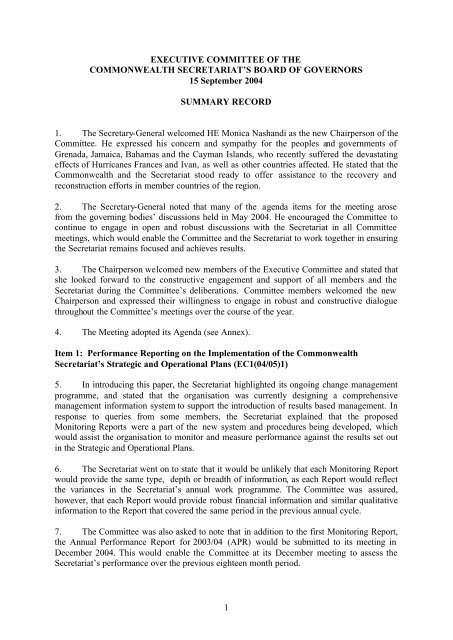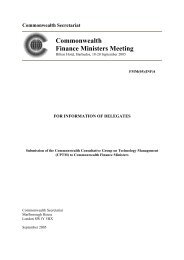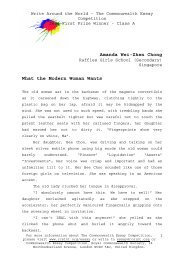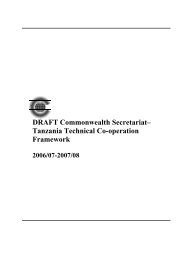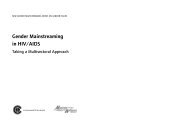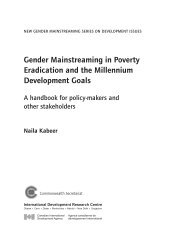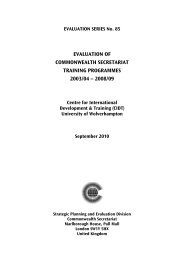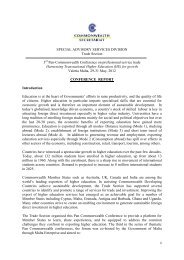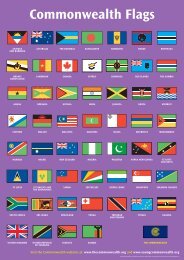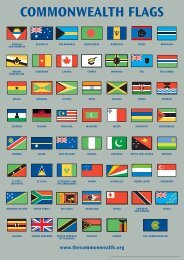EC1(04/05)Agenda - Commonwealth Secretariat
EC1(04/05)Agenda - Commonwealth Secretariat
EC1(04/05)Agenda - Commonwealth Secretariat
You also want an ePaper? Increase the reach of your titles
YUMPU automatically turns print PDFs into web optimized ePapers that Google loves.
EXECUTIVE COMMITTEE OF THE<br />
COMMONWEALTH SECRETARIAT’S BOARD OF GOVERNORS<br />
15 September 20<strong>04</strong><br />
SUMMARY RECORD<br />
1. The Secretary-General welcomed HE Monica Nashandi as the new Chairperson of the<br />
Committee. He expressed his concern and sympathy for the peoples and governments of<br />
Grenada, Jamaica, Bahamas and the Cayman Islands, who recently suffered the devastating<br />
effects of Hurricanes Frances and Ivan, as well as other countries affected. He stated that the<br />
<strong>Commonwealth</strong> and the <strong>Secretariat</strong> stood ready to offer assistance to the recovery and<br />
reconstruction efforts in member countries of the region.<br />
2. The Secretary-General noted that many of the agenda items for the meeting arose<br />
from the governing bodies’ discussions held in May 20<strong>04</strong>. He encouraged the Committee to<br />
continue to engage in open and robust discussions with the <strong>Secretariat</strong> in all Committee<br />
meetings, which would enable the Committee and the <strong>Secretariat</strong> to work together in ensuring<br />
the <strong>Secretariat</strong> remains focused and achieves results.<br />
3. The Chairperson welcomed new members of the Executive Committee and stated that<br />
she looked forward to the constructive engagement and support of all members and the<br />
<strong>Secretariat</strong> during the Committee’s deliberations. Committee members welcomed the new<br />
Chairperson and expressed their willingness to engage in robust and constructive dialogue<br />
throughout the Committee’s meetings over the course of the year.<br />
4. The Meeting adopted its <strong>Agenda</strong> (see Annex).<br />
Item 1: Performance Reporting on the Implementation of the <strong>Commonwealth</strong><br />
<strong>Secretariat</strong>’s Strategic and Operational Plans (<strong>EC1</strong>(<strong>04</strong>/<strong>05</strong>)1)<br />
5. In introducing this paper, the <strong>Secretariat</strong> highlighted its ongoing change management<br />
programme, and stated that the organisation was currently designing a comprehensive<br />
management information system to support the introduction of results based management. In<br />
response to queries from some members, the <strong>Secretariat</strong> explained that the proposed<br />
Monitoring Reports were a part of the new system and procedures being developed, which<br />
would assist the organisation to monitor and measure performance against the results set out<br />
in the Strategic and Operational Plans.<br />
6. The <strong>Secretariat</strong> went on to state that it would be unlikely that each Monitoring Report<br />
would provide the same type, depth or breadth of information, as each Report would reflect<br />
the variances in the <strong>Secretariat</strong>’s annual work programme. The Committee was assured,<br />
however, that each Report would provide robust financial information and similar qualitative<br />
information to the Report that covered the same period in the previous annual cycle.<br />
7. The Committee was also asked to note that in addition to the first Monitoring Report,<br />
the Annual Performance Report for 2003/<strong>04</strong> (APR) would be submitted to its meeting in<br />
December 20<strong>04</strong>. This would enable the Committee at its December meeting to assess the<br />
<strong>Secretariat</strong>’s performance over the previous eighteen month period.<br />
1
8. The Executive Committee welcomed the <strong>Secretariat</strong>’s proposals for monitoring and<br />
reporting on performance, including the preparation of periodic Monitoring Reports. The<br />
Committee noted that the production of such reports was a new initiative and agreed that the<br />
<strong>Secretariat</strong> should provide Monitoring Reports on a semi-annual (rather than quarterly) basis,<br />
in order to enable the collation and analysis of performance data over a meaningful reporting<br />
period. The Committee agreed that the first semi-annual Monitoring Report would be<br />
considered at its meeting in December 20<strong>04</strong> in conjunction with the Annual Performance<br />
Report for 2003/<strong>04</strong>.<br />
Item 2: Prioritising the <strong>Secretariat</strong>’s Work Programme (<strong>EC1</strong>(<strong>04</strong>/<strong>05</strong>)2)<br />
9. In introducing this paper, the <strong>Secretariat</strong> noted that the Board of Governors and the<br />
Executive Committee at their meetings in May had sought additional information on how the<br />
<strong>Secretariat</strong> prioritises its work. It highlighted that the <strong>Secretariat</strong> had undertaken a rigorous<br />
prioritisation process in developing both the Strategic Plan (20<strong>04</strong>/<strong>05</strong> – 2007/08) and<br />
Operational Plan (20<strong>04</strong>/<strong>05</strong> – 20<strong>05</strong>/06), based on mapping the international situation, key<br />
<strong>Commonwealth</strong> issues of concern, and the mandates from the Abuja CHOGM. The strategic<br />
actions and results contained in the Strategic and Operational Plans and approved by the<br />
Board in May 20<strong>04</strong>, identified what the <strong>Secretariat</strong> could best do to respond to these<br />
mandates in light of its past experience, expertise, comparative advantage and existing<br />
commitments.<br />
10. The <strong>Secretariat</strong> drew the Committee’s attention to the discussion under the previous<br />
agenda item, and outlined how the development of a sound framework for monitoring and<br />
tracking progress made against the Plans’ priorities, objectives and results would support the<br />
Committee to carry out its responsibilities in overseeing and monitoring the <strong>Secretariat</strong>’s<br />
work programme and budget. In response to a query from one member, the <strong>Secretariat</strong><br />
explained that the current priorities of the organisation which had emerged from this<br />
prioritisation process were outlined in the Strategic Plan 20<strong>04</strong>/<strong>05</strong> – 2007/08 and Operational<br />
Plan and Budget, 20<strong>04</strong>/<strong>05</strong> – 20<strong>05</strong>/06.<br />
11. The Committee welcomed the prioritisation process utilised by the <strong>Secretariat</strong> in<br />
developing its work programme and budgets, and agreed that it reflected CHOGM mandates.<br />
The role of the <strong>Secretariat</strong> in collaborating with, and supporting the work of regional<br />
development organisations and initiatives such as NEPAD, within the context of the<br />
<strong>Secretariat</strong>’s Plans, was particularly welcomed.<br />
12. Some members of the Committee expressed concern at the recent announcement of<br />
the outcomes of the Sports Ministers meeting held in Athens in July 20<strong>04</strong>, and possible<br />
<strong>Commonwealth</strong> support to anti-doping measures within sport through the provision of<br />
experts to assist developing member countries, as well as other sport and development<br />
activities. Some members questioned whether <strong>Secretariat</strong> action in this area was aligned to<br />
the organisation’s comparative advantage and whether such work fitted into the <strong>Secretariat</strong>’s<br />
Strategic Plan.<br />
13. In response to queries from some Committee members, the <strong>Secretariat</strong> stated that<br />
Sports ministers, at their meeting in Athens in July 20<strong>04</strong>, endorsed the Abuja Communiqué’s<br />
recognition of sport as an important tool for promoting development, particularly with young<br />
people. Ministers in Athens endorsed a <strong>Commonwealth</strong> Action Programme calling upon the<br />
<strong>Commonwealth</strong> to establish a sports advisory body which would advise member states on<br />
2
possible action in the following three key areas: promoting greater participation by women in<br />
sports; assisting developing member countries in anti-doping measures; and facilitating the<br />
exchange of information and experiences between larger member countries that had<br />
successfully hosted major sports events with smaller member countries. The <strong>Secretariat</strong> had<br />
informed Ministers of the <strong>Secretariat</strong>’s limited resources and current priority areas of action<br />
as outlined in the Strategic Plan, drawing their attention to the fact that sports related<br />
activities do not feature in the Plan.<br />
14. The <strong>Secretariat</strong> went on to inform the Committee that the Government of the United<br />
Kingdom had generously agreed to provide an officer from the UK Department of Sports and<br />
Culture on secondment to the <strong>Secretariat</strong>, to work with the organisation in identifying how<br />
the <strong>Commonwealth</strong> might assist member countries on sport and development issues. The<br />
officer would commence his work with the <strong>Secretariat</strong> in November 20<strong>04</strong>.<br />
15. The Committee recalled its discussion in the development and approval of the<br />
<strong>Secretariat</strong>’s Strategic Plan and noted the <strong>Secretariat</strong>’s limited resources and the parameters<br />
of the Strategic Plan. It cautioned against the inclusion of new activities for which resources<br />
had been not been allocated either in the Strategic Plan or Operational Budget for 20<strong>04</strong>/<strong>05</strong> –<br />
20<strong>05</strong>/06, which reflect the agreed priorities for <strong>Secretariat</strong> action. Some members went on to<br />
suggest that those member countries that wished to support sport related activities should be<br />
requested to provide additional resources in support of such action.<br />
16. The Committee noted that Sport Ministers at their meeting in July 20<strong>04</strong> had urged the<br />
<strong>Secretariat</strong> to explore how sport could be promoted as a tool for development, particularly in<br />
relation to assisting developing member countries to address anti-doping and youth and<br />
development issues. It welcomed the secondment of a sport advocacy expert from the UK<br />
Government to the <strong>Secretariat</strong> to assist the organisation in developing possible<br />
<strong>Commonwealth</strong> responses to Sport Ministers’ recommendations. It requested the <strong>Secretariat</strong>,<br />
with the assistance of the seconded officer, to submit a costed proposal on possible actions to<br />
address these issues, and mechanisms for mobilising extra-budgetary resources to support<br />
such actions, for the Committee’s consideration at its meeting in December 20<strong>04</strong>.<br />
Item 3: <strong>Commonwealth</strong> <strong>Secretariat</strong> Travel Expenditure and Policy (<strong>EC1</strong>(<strong>04</strong>/<strong>05</strong>)3)<br />
17. In introducing this paper, the <strong>Secretariat</strong> recalled the Committee’s discussion of this<br />
issue at previous meetings. It drew the Committee’s attention to the range of cost-savings<br />
measures that the organisation had already put in place, designed to cut travel costs without<br />
jeopardising the quality of its work and ability to respond to member countries across the<br />
<strong>Commonwealth</strong>. It highlighted that travel is an inevitable part of the <strong>Secretariat</strong>’s work<br />
because it does not have field offices, other than the CYP Regional Centres. It further<br />
highlighted that greater demand for <strong>Secretariat</strong> assistance, particularly in the Pacific region,<br />
inevitably would require additional travel and would increase costs. It stressed the need to<br />
ensure that <strong>Secretariat</strong> managers had the flexibility to select the most appropriate way of<br />
responding to requests for assistance, rather than enforce an arbitrary target for reducing costs<br />
which may inhibit and even compromise the <strong>Secretariat</strong>’s ability to implement its<br />
Programmes and achieve the results articulated in the Strategic Plan. The <strong>Secretariat</strong> assured<br />
the Committee that it continued to explore additional cost-savings measures that could be<br />
used effectively and appropriately.<br />
3
18. Some Committee members sought additional information on the travel entitlements of<br />
staff and the costs of bringing candidates for interview from across the <strong>Commonwealth</strong>. In<br />
response to these queries, the <strong>Secretariat</strong> stated that staff serving under the old terms and<br />
conditions of service were ensured certain travel entitlements as part of their contractual<br />
arrangements. It went on to explain that staff serving under the new terms and conditions of<br />
service did not have such entitlements in their contracts and that travel policy was now<br />
incorporated in the Staff Rules and Regulations alone. With regard to bringing candidates<br />
from across the <strong>Commonwealth</strong> for interviews, it assured the Committee that travel costs<br />
were borne in mind when selecting candidates for interview. It was important to assess<br />
candidates from across the <strong>Commonwealth</strong> to ensure that recruitment processes and<br />
opportunities for <strong>Commonwealth</strong> citizens at the <strong>Secretariat</strong> were open and fair to all<br />
applicants, and to ensure a geographical balance in the organisation’s establishment.<br />
19. In response to a query, the <strong>Secretariat</strong> went on explain that certain travel costs were<br />
often beyond its control including the rising surcharges levied by airlines due to high oil<br />
prices and last minute changes in the travel plans of members of <strong>Commonwealth</strong> Election<br />
Observer Groups.<br />
20. The Committee welcomed measures to achieve savings in travel costs implemented<br />
by the <strong>Secretariat</strong> to-date. The Committee noted the ongoing review of the <strong>Secretariat</strong>’s travel<br />
policy and further cost-saving measures currently being explored and encouraged the<br />
<strong>Secretariat</strong> to continue to implement cost-saving measures. The <strong>Secretariat</strong> was requested to<br />
provide an update on the timeframes for completion of current reviews, and any conclusions<br />
available, to the Committee at its meeting in December 20<strong>04</strong>.<br />
Item 4: <strong>Commonwealth</strong> <strong>Secretariat</strong> Recruitment and Rotation Policy (<strong>EC1</strong>(<strong>04</strong>/<strong>05</strong>)4)<br />
21. In introducing this paper, the <strong>Secretariat</strong> recalled the Committee’s discussions of this<br />
matter at its previous meetings. The <strong>Secretariat</strong> outlined how the <strong>Secretariat</strong> was<br />
implementing a rotation policy for all diplomatic and professional staff. Diplomatic staff<br />
usually served two three-year contracts, and professional staff usually served up to three<br />
three-year contracts, subject to satisfactory performance. The resulting turnover of staff<br />
enabled member governments and countries to benefit from staff who leave the organisation<br />
to contribute to national development in home countries, as well enable fresh views, thinking<br />
and expertise from all around the <strong>Commonwealth</strong> continuously to regenerate the <strong>Secretariat</strong><br />
and its work. The <strong>Secretariat</strong> was also enabling <strong>Commonwealth</strong> citizens to contribute to the<br />
<strong>Secretariat</strong>’s work through internships. It went on to highlight that the policy does have an<br />
impact, however, on the budget, not least the travel budget which was discussed under the<br />
previous agenda item, because of the higher incidence of travel for job interviews and of<br />
installation/repatriation allowances.<br />
22. The <strong>Secretariat</strong> went on to state that the costs of interviewing candidates from across<br />
the <strong>Commonwealth</strong> were considered in drawing up shortlists, as well as the need for<br />
maintaining geographical balance in its recruitment policies. Cost-savings measures were<br />
applied through a variety of means, including interviewing several candidates for similar<br />
posts at one time.<br />
23. In considering this paper, the Chairperson recalled the Committee’s discussion under the<br />
previous agenda item, and suggested that this matter be considered in conjunction with the<br />
cost-savings measures applied by the <strong>Secretariat</strong> in its general travel policy and expenditure.<br />
4
24. In response to queries from some members, the <strong>Secretariat</strong> stated that it was necessary<br />
to provide reasonable expectations to potential candidates relocating from <strong>Commonwealth</strong><br />
countries to London on the likely number of contracts to be offered, but with the strict<br />
proviso that any renewal of contract would be subject to performance. It went on to explain<br />
that three-year contracts provided an appropriate balance between the reasonable expectations<br />
of and inducement for staff (most of whom were not seconded from governments and so had<br />
no post to return to automatically at the conclusion of their tenure with the <strong>Secretariat</strong>) to<br />
relocate to London, and the need for a turnover of staff and expertise to remain relevant to the<br />
<strong>Secretariat</strong>’s changing priorities and human resource needs. The policy also took account of<br />
the prohibitive costs of replacing diplomatic and professional staff every three years.<br />
25. The Committee noted the contents of the paper outlining the rationale of the current<br />
time-frames for diplomatic and professional staff, and the impact of the rotation policy on<br />
travel costs. It requested the <strong>Secretariat</strong> to explore possible alternative models for the duration<br />
of staff contracts.<br />
Item 5: Implications of a Merger of the Economic Affairs Division and the Special<br />
Advisory Services Division (<strong>EC1</strong>(<strong>04</strong>/<strong>05</strong>)5)<br />
26. In introducing this paper, the <strong>Secretariat</strong> highlighted that the organisation had recently<br />
undertaken a number of measures to streamline its organisational structure to enable efficient<br />
and effective programme delivery. These changes included the merger of the CFTC divisions<br />
from four to two in 2002; the Special Advisory Services Division (SASD) itself was a result<br />
of those mergers. The Committee was asked to note that whilst SASD and the Economic<br />
Affairs Division (EAD) worked in similar Programme areas, their work was directed by<br />
different mandates and focused on very distinct but complementary areas of work. For<br />
example, while both divisions worked on international trade and debt issues, EAD focused<br />
primarily on an advisory, brokerage and catalysing (‘ABC’) role related to policy frameworks<br />
and international negotiations and agreements related to these issues, whereas SASD<br />
provided practical assistance to member countries as a means of building institutional<br />
capacity to implement, or meet obligations under, these policies and agreements.<br />
27. The <strong>Secretariat</strong> went on to state that the two divisions were also funded primarily by<br />
two different funding sources, and cautioned that any merger of the divisions may constrain<br />
the divisions’ ability to carry out their different roles for which each had a specific<br />
comparative advantage, experience and expertise. In addition, any merger may also challenge<br />
the integrity of the funds used to support their work, one of which could only be used for<br />
policy and consensus building work, and the other could only be used for the provision of<br />
technical assistance. The <strong>Secretariat</strong> stated that the organisation was committed to selfrenewal<br />
and improvement and remained alert to the possibility of organising itself in new and<br />
different way as mandates evolve and change.<br />
28. The Committee welcomed the <strong>Secretariat</strong>’s paper, accepted that the divisions<br />
performed different functions within the context of the Strategic Plan and noted the efficiency<br />
gains already achieved through the mergers which took place in 2002. The <strong>Secretariat</strong> was<br />
urged to continue to be mindful of the potential cost-savings and improved programme<br />
delivery which can be achieved through mergers and co-locating such divisions, however,<br />
and remain open to the possibility of mergers in the future if additional programme delivery<br />
and efficiency gains could be achieved.<br />
5
29. Committee members sought additional information on aspects of the divisions’ work<br />
programmes and areas of separate and collaborative action, and suggested that the <strong>Secretariat</strong><br />
maintain an open dialogue with High Commissions on the implementation of the <strong>Secretariat</strong>’s<br />
work on international economic issues.<br />
30. The <strong>Secretariat</strong> stated that the mergers of the CFTC divisions in 2002 had resulted in<br />
a high level of cross-divisional programme development and implementation, and highlighted<br />
the collaboration between EAD and SASD, and with other divisions, on specific subjects<br />
including WTO accession and capital markets development. Other collaborative work among<br />
divisions included a range of activities focusing on gender, HIV/AIDS, and public sector<br />
reform.<br />
31. It went on to highlight a series of briefings already underway with representatives of<br />
some member countries on the Doha Round and assured the Committee that all High<br />
Commissions would be invited to future briefings. It went on to add that the new reporting<br />
arrangements, discussed earlier in the Committee’s meeting, and the Committee and Board’s<br />
involvement in the prior determination of the <strong>Secretariat</strong> Strategic and Operational Plans and<br />
budget all provide additional opportunities for Board members to familiarise themselves with,<br />
and contribute to the orientation of, the work of SASD and EAD and all other Divisions.<br />
32. The Committee noted the contents of the paper and the cross-divisional collaboration<br />
between EAD and SASD, as well between the latter and other Divisions, in the<br />
implementation of the <strong>Secretariat</strong>’s Programmes. It agreed that the two Divisions should<br />
continue to operate as separate Divisions at this time. The Committee welcomed the<br />
opportunities identified by the <strong>Secretariat</strong> for member countries to engage in dialogue with<br />
the <strong>Secretariat</strong> on various aspects of its work, particularly those relating to international<br />
economic policy issues. The Chairperson encouraged all members to participate in meetings<br />
convened by the <strong>Secretariat</strong> to discuss past and future activities. The <strong>Secretariat</strong> was<br />
requested to put discussion of the international economic work of the <strong>Secretariat</strong> on the<br />
agenda of the Committee’s December 20<strong>04</strong> meeting.<br />
Item 6: Extra Budgetary Resources (<strong>EC1</strong>(<strong>04</strong>/<strong>05</strong>)6)<br />
33. In introducing this paper, the <strong>Secretariat</strong> clarified that Extra Budgetary Resources<br />
(EBR) referred to all resources received by the <strong>Secretariat</strong> over and above those received for<br />
the organisation’s core budgets (<strong>Commonwealth</strong> <strong>Secretariat</strong> Assessed Budget,<br />
<strong>Commonwealth</strong> Fund for Technical Co-operation and <strong>Commonwealth</strong> Youth Programme). It<br />
went on to explain that any report outlining EBR must be separate to the standard financial<br />
reports prepared for the Committee, because the timing and nature of EBR secured varied<br />
according to the source, and was often different in nature from the <strong>Secretariat</strong>’s core funding.<br />
It stated that is was possible to identify resources once received and utilised but difficult to<br />
predict the scale and nature of EBR that might be secured in the coming year. An additional<br />
issue to consider was also the estimated monetary value of EBR received through nonfinancial<br />
contributions.<br />
34. The Committee welcomed the details provided in the paper on Extra-Budgetary<br />
Resources and commended the <strong>Secretariat</strong> on the presentation of this information. The<br />
Committee looked forward to receiving similar reports on Extra-Budgetary Resources at<br />
future meetings, in addition to the regular financial reports.<br />
6
Item 7: <strong>Commonwealth</strong> <strong>Secretariat</strong> Accounts for 2002/03 (<strong>EC1</strong>(<strong>04</strong>/<strong>05</strong>)7)<br />
35. In introducing this paper, the <strong>Secretariat</strong> highlighted that the full audit report was<br />
awaited (expected at the end of September 20<strong>04</strong>) but the auditors had indicated that they<br />
would issue a qualified opinion on the 2002/03 accounts. The qualification is based on<br />
amounts written off/back in the accounts of all the four funds. The write off/back amounts<br />
relate to un-reconciled balances on the inter-fund accounts, which were caused by<br />
weaknesses in the financial system. It was reported that measures had since been adopted to<br />
deal with the weaknesses. The auditor had indicated that although there is uncertainty<br />
regarding the amounts, there was no evidence of fraud or loss of funds.<br />
36. In response to queries from some Committee members, the auditors provided<br />
additional detailed explanations of their interim findings and the qualifications that would be<br />
placed on the accounts. They also explained that they had previously identified and reported<br />
on some of the weaknesses and noted the <strong>Secretariat</strong>’s efforts to deal with them.<br />
37. The Committee commended the <strong>Secretariat</strong> for its continuing efforts to improve the<br />
financial management system, and noted the contents of the paper. The Committee noted the<br />
information provided by the <strong>Secretariat</strong>’s auditors on residual issues affecting the final<br />
certification of 2002/03 accounts and agreed to consider the auditors’ final report when it was<br />
available.<br />
Item 8: <strong>Commonwealth</strong> <strong>Secretariat</strong>’s Staff Pensions Scheme (<strong>EC1</strong>(<strong>04</strong>/<strong>05</strong>)8)<br />
38. In introducing this paper, the <strong>Secretariat</strong> recalled the Committee’s request at its<br />
meeting in March 20<strong>04</strong> for an update on the financial position of the <strong>Secretariat</strong> staff and<br />
former Secretaries-General pension schemes. It explained that actuarial information on the<br />
staff pension scheme required to assess its expected liabilities was expected in April 20<strong>05</strong>.<br />
After this, the <strong>Secretariat</strong> stated that it would seek specialist advice on how to approach<br />
liabilities under the staff and former Secretaries-General schemes and report back to the<br />
Committee with its findings and recommendations. The recommendations will take into<br />
account the liquidity and strength of the <strong>Secretariat</strong>’s balance sheet, including arrears of<br />
contributions from member governments.<br />
39. In response to queries from some Committee members, the <strong>Secretariat</strong> explained that<br />
the pension arrangements for future Secretaries-General are part of their prospective terms of<br />
employment, which are decided by Heads of Government. It went on to explain that a higher<br />
collection rate of arrears due to the <strong>Secretariat</strong> would strengthen the organisation’s balance<br />
sheet and strengthen its capacity to deal with its liabilities.<br />
40. Some Committee members sought additional information on what contingency plans<br />
the <strong>Secretariat</strong> was making for meeting any funding gap relating to liabilities under the<br />
schemes. The <strong>Secretariat</strong> stated that specific contingency plans would be made once the<br />
actuarial information and analysis sought was available in April 20<strong>05</strong>. It went on to draw the<br />
Committee’s attention to a range of measures that had already been out in place including:<br />
the closing of the staff scheme to new members in 2001; the greater use of gratuities rather<br />
than the pension scheme for new staff; and restricting the purchasing of annuities for staff<br />
that had retired. All member governments, including the <strong>Secretariat</strong>’s major donors, had been<br />
alerted at previous governing body meetings to a possible funding gap for staff on the old<br />
scheme which the <strong>Secretariat</strong> would be obligated legally to meet. It stressed, however, that<br />
7
the <strong>Secretariat</strong> was able to meet its current liabilities, and the work being undertaken at<br />
present was to ensure appropriate solutions for any future liabilities would be available and<br />
manageable.<br />
41. The <strong>Secretariat</strong> highlighted that the difficulties experienced with the pension scheme<br />
was affecting many pension schemes throughout the United Kingdom and beyond due to<br />
poor performance of pension funds and increased longevity of the population. The <strong>Secretariat</strong><br />
remained hopeful that solutions to address the issue would be found in due course.<br />
42. The Committee noted the contents of the paper. The Committee requested the<br />
<strong>Secretariat</strong> to provide options for meeting any possible shortfall in resources in the<br />
<strong>Secretariat</strong>’s pension schemes for former Secretaries-General and staff at a future meeting,<br />
once actuarial information and analysis was made available in April 20<strong>05</strong>.<br />
Item 9: Election of Members of the Accreditation Committee (<strong>EC1</strong>(<strong>04</strong>/<strong>05</strong>)9)<br />
43. The Committee noted the contents of the paper. Australia, The Gambia, the<br />
Maldives, Nigeria, and Tonga were elected as new members of the Accreditation Committee.<br />
Guyana was appointed as an ex-officio member of the Committee in light of its appointment<br />
as Chairperson of the Board of Governors.<br />
44. The Committee also agreed that on such occasions when current members of the<br />
Accreditation Committee step down from the Executive Committee prior to the completion of<br />
their term of office in the Accreditation Committee, these members would complete their full<br />
term of office in the Accreditation Committee even though they would not be a member of<br />
the Executive Committee in the second year of office.<br />
45. In light of concerns raised by some members of the Board of Governors on the<br />
accreditation of civil society organisations to the <strong>Commonwealth</strong>, the Executive Committee<br />
agreed that final authority for approving the accreditation of such organisations should lie<br />
with the Board. The Executive Committee agreed further that the Accreditation Committee<br />
should assess accreditation applications twice a year at its meetings and make<br />
recommendations to the Board for final approval of the accreditation of organisations. It was<br />
agreed that the Chair of the Accreditation Committee would write formally to all members of<br />
the Board with its recommendations for approval of accreditation applications, and the Board<br />
would be invited to respond within six weeks of the circulation of the Accreditation<br />
Committee’s recommendations. If no Board members submitted objections in writing within<br />
six weeks of the circulation of the recommendations, the Accreditation Committee’s<br />
recommendations on accreditation of organisations to the <strong>Commonwealth</strong> would be deemed<br />
to be accepted. If a Board member raised concerns about an application, that application<br />
would be referred to the next Board meeting.<br />
Item 10: Any Other Business<br />
Small States’ Joint Office in New York<br />
46. The <strong>Secretariat</strong> briefed the Committee on progress made in the implementation of the<br />
recommendations of the evaluation study of the Small State Joint Office in New York. It<br />
highlighted that donors had met and agreed in June 20<strong>04</strong> the Office’s budget for 20<strong>04</strong>/<strong>05</strong>; the<br />
Manager’s post had been reviewed and advertised; and, in the light of the resignation of the<br />
8
Office’s researcher, the <strong>Secretariat</strong> would be exploring with donors and participating<br />
governments on the needs of the Office in this regard and the best way of addressing them. It<br />
drew the Committee’s attention to the forthcoming meeting of tenants and donors in New<br />
York on 24 September 20<strong>04</strong> to discuss administrative matters, as well as the Office’s revised<br />
draft Memorandum of Understanding (MoU). It confirmed that the substantive budgetary<br />
oversight of the Office would henceforth be considered by the Board’s Executive Committee<br />
in London as part of the Executive Committee’s consideration of the overall <strong>Secretariat</strong><br />
budget, and that the annual meeting in New York of tenants and donors would receive budget<br />
reports and consider administrative matters.<br />
47. In response to queries from some Committee members, the <strong>Secretariat</strong> agreed to send<br />
electronic versions of the revised draft MoU to all Committee members, and confirmed that<br />
some arrears owed by smaller tenants had been collected but that the contribution from one<br />
donor was still outstanding. It went on to highlight that the constraints posed by non-payment<br />
of arrears would affect the implementation of restructuring recommendations contained in the<br />
independent consultant’s report. Provided all countries meet their agreed current<br />
contributions, it would still be possible to operate the Office and provide the key areas of<br />
assistance to the tenants; the <strong>Secretariat</strong> stressed, however, that if the financial position of the<br />
Office did not improve, more drastic measures may be required.<br />
48. The Committee welcomed the update provided by the <strong>Secretariat</strong> on progress made in<br />
the implementation of the recommendations of the consultant’s report on the Small States<br />
Joint Office in New York. It noted that a meeting of tenants would take place in New York<br />
on 24 September 20<strong>04</strong> to discuss administrative matters and feedback from donors and<br />
tenants on the draft revised MoU. The <strong>Secretariat</strong> was requested to provide an electronic<br />
copy of the draft MoU to Executive Committee members.<br />
49. The Committee also noted that one donor had yet to pay their arrears to the Joint<br />
Office budget. The Chairperson encouraged all donors to pay all arrears in full to enable the<br />
Office to function effectively at an optimum level.<br />
Item 10: Any Other Business<br />
20<strong>05</strong> CHOGM Update<br />
50. The Committee welcomed the update by the Secretary-General on the 20<strong>05</strong> CHOGM.<br />
It noted that the Secretary-General had consulted widely with Heads of Government on the<br />
duration and format of the next CHOGM. Malta as host of the next CHOGM had proposed<br />
that the CHOGM theme be “Networking the <strong>Commonwealth</strong> for Development”. The<br />
<strong>Commonwealth</strong> Chairperson-in-Office, President Obasanjo of Nigeria, had convened a<br />
meeting of a group of Heads of Governments in New York on 23 September to consider all<br />
views received thus far. The conclusions of the mini-summit would be presented to<br />
<strong>Commonwealth</strong> Foreign Ministers at their meeting, also in New York, on 23 September<br />
20<strong>04</strong>.<br />
51. The Committee noted that an Extra-ordinary Meeting of the <strong>Secretariat</strong>’s Board of<br />
Governors would take place on 6 October 20<strong>04</strong> to appoint new members of the<br />
<strong>Commonwealth</strong> <strong>Secretariat</strong> Arbitral Tribunal (CSAT). It also noted that the Board would<br />
reconvene as a meeting of High Commissioners after concluding its business relating to the<br />
9
CSAT, and the Secretary-General would brief High Commissioners on the outcomes of the<br />
mini-summit and Foreign Ministers meeting held in New York.<br />
52. One Committee member recalled that the Board of Governors at its meeting in May<br />
20<strong>04</strong> rejected the Committee’s request for a paper on the <strong>Secretariat</strong>’s work on international<br />
economic issues, but agreed that the Committee should continue dialogue on this work, if it<br />
so chose, at future Committee meetings. The <strong>Secretariat</strong> agreed to the Committee’s request to<br />
place this issue on the Committee’s agenda at its meeting in December 20<strong>04</strong>.<br />
Dates of Future Meetings<br />
53. The Committee confirmed the dates of the meetings of the <strong>Secretariat</strong>’s governing<br />
bodies for 20<strong>04</strong>/<strong>05</strong> as follows:<br />
Executive Committee: 14 December 20<strong>04</strong><br />
10 March 20<strong>05</strong><br />
10 -12 May 20<strong>05</strong><br />
Board of Governors: 13 May 20<strong>05</strong><br />
SPED<br />
18 October 20<strong>04</strong><br />
10
<strong>Commonwealth</strong> <strong>Secretariat</strong><br />
Meeting of the Executive Committee<br />
of the Board of Governors<br />
Marlborough House, 15 September 20<strong>04</strong><br />
DRAFT<br />
PROVISIONAL AGENDA AND PROGRAMME<br />
11<br />
<strong>EC1</strong>(<strong>04</strong>/<strong>05</strong>)<strong>Agenda</strong><br />
1. Performance Reporting on the Implementation of the <strong>Commonwealth</strong> <strong>Secretariat</strong>’s<br />
Strategic and Operational Plans (<strong>EC1</strong>(<strong>04</strong>/<strong>05</strong>)1)<br />
2. Prioritising the <strong>Secretariat</strong>’s Work Programme (<strong>EC1</strong>(<strong>04</strong>/<strong>05</strong>)2)<br />
3. <strong>Commonwealth</strong> <strong>Secretariat</strong> Travel Expenditure and Policy (<strong>EC1</strong>(<strong>04</strong>/<strong>05</strong>)3)<br />
4. <strong>Commonwealth</strong> <strong>Secretariat</strong> Recruitment and Rotation Policy (<strong>EC1</strong>(<strong>04</strong>/<strong>05</strong>)4)<br />
5. Implications of a merger of the Economic Affairs Division and the Special Advisory<br />
Services Division (<strong>EC1</strong>(<strong>04</strong>/<strong>05</strong>)5)<br />
6. Extra Budgetary Resources (<strong>EC1</strong>(<strong>04</strong>/<strong>05</strong>)6)<br />
7. <strong>Commonwealth</strong> <strong>Secretariat</strong> Accounts for 2002/03 (<strong>EC1</strong>(<strong>04</strong>/<strong>05</strong>)7)<br />
8. <strong>Commonwealth</strong> <strong>Secretariat</strong>’s Staff Pensions Scheme (<strong>EC1</strong>(<strong>04</strong>/<strong>05</strong>)8)<br />
9. Election of Members of the Accreditation Committee (<strong>EC1</strong>(<strong>04</strong>/<strong>05</strong>)9)<br />
10. Any Other Business<br />
- Update on Joint Office for Small States<br />
- Update on 20<strong>05</strong> CHOGM
Meeting of the Executive Committee of the Board of Governors<br />
Wednesday 15 September 20<strong>04</strong><br />
09:45 hrs – 10:00 hrs Refreshments<br />
15 September 20<strong>04</strong><br />
Programme<br />
10:00 – 11:30 hrs Provisional <strong>Agenda</strong> Items 1 and 2<br />
11:30 – 11:45 hrs Refreshments<br />
11:45 – 13:00 hrs Provisional <strong>Agenda</strong> Items 3 & 4<br />
13:00 - 14:15 hrs Buffet Lunch<br />
14:15 - 15:30 hrs Provisional <strong>Agenda</strong> Item 5 & 6<br />
15:30 - 15:45 hrs Refreshments<br />
15:45 - 17:00 hrs Provisional <strong>Agenda</strong> Items 7, 8, 9 & 10<br />
12
MEETING OF THE EXECUTIVE COMMITTEE<br />
OF THE BOARD OF GOVERNORS<br />
ATTENDANCE LIST<br />
Wednesday 15 September 20<strong>04</strong><br />
Main Conference Room, Marlborough House<br />
COUNTRY NAME AND DESIGNATION<br />
AUSTRALIA Mr Greg Ralph, First Secretary<br />
Mr Duncan Howitt, Executive Officer<br />
BARBADOS H. E. Mr Edwin Pollard, High Commissioner<br />
CANADA Mr Ron Hoffmann, Minister<br />
Mr Alex McNivan, Counsellor<br />
THE GAMBIA H. E. Mr Gibril Seman Joof, High Commissioner<br />
GUYANA H. E. Mr Laleswa K N Singh, High Commissioner<br />
INDIA Mr Mridul Kumar, First Secretary<br />
MALDIVES Mr Iruthisham Adam, Second Secretary<br />
MALTA H. E. Dr George Bonello-DuPuis, High Commissioner<br />
NAMIBIA (Chair EC) H. E. Mrs Monica Nashandi, High Commissioner<br />
Mrs Adri Pillay, First Secretary<br />
NEW ZEALAND Ms Georgina Roberts, First Secretary<br />
NIGERIA Mr Akin A Fayomi, Minister<br />
ST LUCIA<br />
H. E. Mr Emmanuel H Cotter M.B.E. High Commissioner<br />
Mrs Lucy Corrinett<br />
SINGAPORE Mr Winston Goh, First Secretary (Political)<br />
SOUTH AFRICA Mr Eli Bitzer, Foreign Affairs, Pretoria<br />
Mrs Janet Kotze, First Secretary<br />
TONGA Miss Sela Moengangongo, First Secretary<br />
13
COUNTRY NAME AND DESIGNATION<br />
UNITED KINGDOM Mr Adrian Bedford, FCO<br />
Ms Dorothy Kirkwood, DFID<br />
COMMONWEALTH SECRETARIAT<br />
Secretary-General Mr Ignatius Takawira<br />
Mr Winston Cox Mr Roy Rodrigues<br />
Mrs Florence Mugasha Ms Juliette Solomon<br />
Ms Nancy Spence Mr Simon Gimson<br />
Mr Amitav Banerji Ms Juliette Solomon<br />
Mr Joel Kibazo Ms Sharon Robinson<br />
Ms Alexandra Jones Mrs Shobhna Rattansi<br />
Mr Matthew Neuhaus Mr Ayo Oke<br />
Mr George Saibel Ms Sabhita Raju<br />
Ms Marion Cowden Mrs Oluwatoyin Job<br />
Dr Victor Ayeni Mr Tyson Mason<br />
Ms Betty Mould-Iddrisu Ms Nancy Jarrett<br />
Mr S Shafuddin Mrs Mary-Anne Cushion<br />
Dr Elizabeth Brouwer<br />
14


